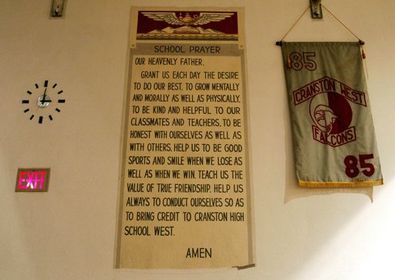 When I was growing up, I remember going to SMU homecoming football game against the University of Texas. We were asked to” bow our heads in the name of Jesus Christ” and offer a prayer. I didn’t like it, and I didn’t bow my head; but I also did not bat an eye. This was, after all, Texas.
When I was growing up, I remember going to SMU homecoming football game against the University of Texas. We were asked to” bow our heads in the name of Jesus Christ” and offer a prayer. I didn’t like it, and I didn’t bow my head; but I also did not bat an eye. This was, after all, Texas.
They probably don’t do that anymore. There’s just a tacit understanding that too many people out there might not think of Jesus as “our Lord.”
But I’m not sure. I’m not even sure if there’s a church-state issue involved. SMU isn’t a state school, although UT is, but I think in the intervening years, Jews, atheists and others have spoken up enough to keep that particular practice at bay.
This is why the case of 16-year-old Cranston, Rhode Islander Jessica Ahlquist caught my eye. Jessica objected to prayer that has hung in the auditorium of her high school, Cranston West, since 1963. The prayer is benign enough, “Our Heavenly Father, grant us each day the desire to do our best, to grow mentally and morally as well as physically, to be kind and helpful…Amen.” It is eight feet high and papered to the wall.
Jessica, baptized Catholic, stopped believing in God at a young age. To her the prayer was an offense. She said nothing about it, though, until an anonymous parent filed a complaint with the American Civil Liberties Union. Jessica took it upon herself to speak at all the hearings the school board held in its wake. Almost a year ago, the school board voted to keep the prayer, after which Rhode Island chapter ACLU asked Jessica to serve as plaintiff in a lawsuit.
In January, a federal judged ruled that the prayer’s presence in the school was unconstitutional. In February, the school board decided against appealing the decision.
Jessica Ahlquist has more fortitude than most 16-year-olds I know. She has withstood withering criticism in her deeply Catholic city. She has been slurred, insulted, reamed out online, curse, reviled, you name it. The rhetoric has been hostile and inflammatory, the situation divisive.
Nonetheless, Jessica has stood her ground. And I admire her.
Maybe Jessica shouldn’t have made such a fuss about a prayer that had been present for 49 years, something, clearly, the majority would prefer to leave in place. But it’s the Jessica Ahlquists of America — sometimes Jewish, sometimes Muslim, Buddhist or atheist — who test the limits of what the Constitution allows. By challenging the majority, by excluding religion from the public sphere (or preventing its establishment), she enables the rest of us to worship freely. America, with no state religion, has allowed us as Jews to flourish in in unprecedented ways.
Contrast this to the case of Hamsa Kashgari, the 23-year-old Saudi Arabian blogger and columnist who tweeted his complex feelings about Allah and Islam, only to be greeted with calls for his death.
Kashgari, who blogged an imaginary conversation between himself and the prophet, fled Saudi Arabia for Malaysia en route to New Zealand, fearing for his life. More than 30,000 hate comments, including death threats, accumulated on Twitter in less within 24 hours. Kashgari has apologized for his comments, but nonetheless was arrested in the Kuala Lampur airport, held by Malaysian officials and prevented from speaking with his attorneys, and then extradited back to Saudi Arabia.
There the charge of blasphemy is punishable by death. Kashgari will likely face trial, and though Reuters reported it is unlikely he’ll be executed if found guilty, especially if he repents, he will “almost certainly” face harsh punishment. Already the Saudi Information Minister Abdul-Aziz Khoja has instructed to ban him from writing for any Saudi newspaper or magazine.
The cases of Jessica Ahlquist and Hamza Kashgari are not so different. They both offended a majority position with their views on religion and God. Kashgari has the misfortune to live in a country where the state would not only throw him to the mob, but would quash any voices in support along with him.
Jessica Ahlquist, however, has the good fortune to be American, where the state, in fact, defends her right to criticize a school prayer, against the tyranny of “the mob.” Ahlquist can be threatened, badgered and maligned on Facebook, but it was the judicial system, backed by more than 200 years of case law, that protects her, protects you and protects me.
It never ceases to amaze me how wondrous a gift this is.
In Kashgari’s world, I’d still be in trouble for not bowing my head for a prayer at a public sports event. In Jessica Ahlquist’s world, where I also reside, I hold my head up — free to remember that my prayers can be different.

Hi Marla- Brilliant. Thanks for the Friday morning brightener. Shabbat Shalom, and maybe we can get together the next time I am in NYC! Love ya- Galia